The loud crack rang out from the fog above the Baishui No. 1 Glacier as a stone shard careened down the ice, flying past Chen Yanjun as he operated a GPS device.
More projectiles were tumbling down the hulk of ice that scientists say is one of the world's fastest melting glaciers.
"We should go," said the 30-year-old geologist. "The first rule is safety."
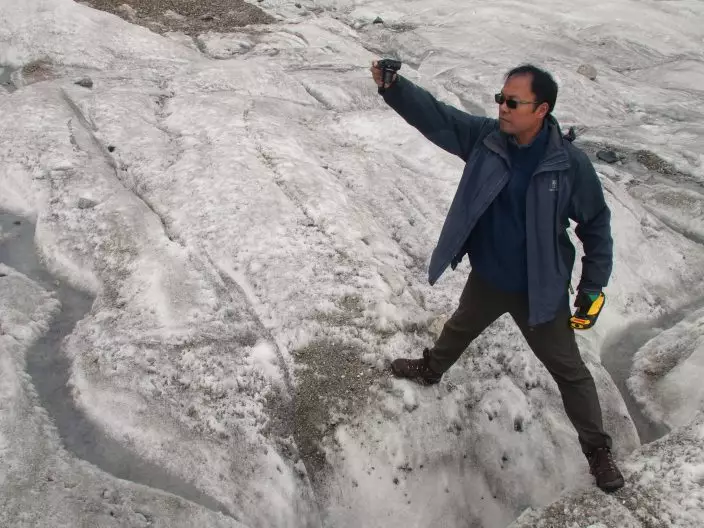
This Sept. 22, 2018 photo shows glaciologist Wang Shijin photographing an ice crevasse in the Baishui Glacier No. 1 on the Jade Dragon Snow Mountain in the southern province of Yunnan in China. Scientists say the glacier is one of the fastest melting glaciers in the world due to climate change and its relative proximity to the Equator. It has lost 60 percent of its mass and shrunk 250 meters since 1982. (AP PhotoSam McNeil)
Chen hiked away and onto a barren landscape once buried beneath the glacier. Now there is exposed rock littered with oxygen tanks discarded by tourists visiting the 15,000-foot (4,570-meter) -high blanket of ice in southern China.
"You're talking about one of the world's largest freshwater sources," said Ashley Johnson, energy program manager at the National Bureau of Asian Research, an American think tank. "Depending on how it melts, a lot of the freshwater will be leaving the region for the ocean, which will have severe impacts on water and food security."
Baishui is about as close to the Equator as Tampa, Florida. And the impacts of climate change already are dramatic.
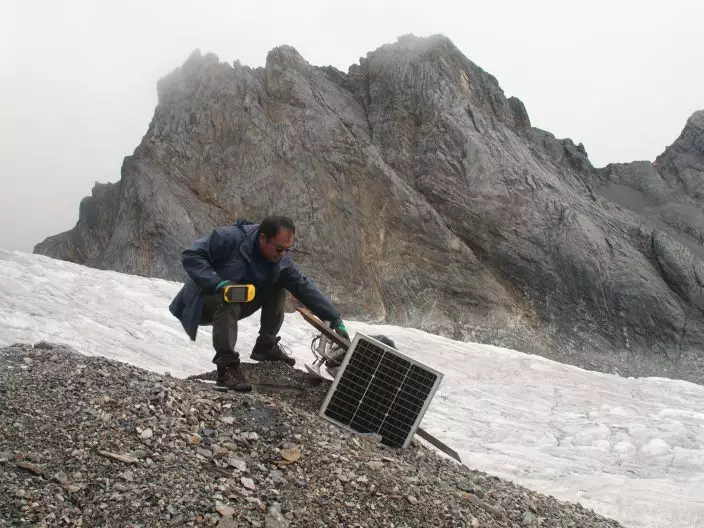
This Sept. 22, 2018 photo shows glaciologist Wang Shijin repairing a broken remote meteorological station on the Baishui Glacier No. 1 on the Jade Dragon Snow Mountain in the southern province of Yunnan in China. Scientists say the glacier is one of the fastest melting glaciers in the world due to climate change and its relative proximity to the Equator. It has lost 60 percent of its mass and shrunk 250 meters since 1982. (AP PhotoSam McNeil)
The glacier has lost 60 percent of its mass and shrunk 250 meters (820 feet) since 1982, according to a 2018 report in the Journal of Geophysical Research.
Scientists found in 2015 that 82 percent of glaciers surveyed in China had retreated. They warned that the effects of glacier melting on water resources are gradually becoming "increasingly serious" for China.
"China has always had a freshwater supply problem with 20 percent of the world's population but only 7 percent of its freshwater," said Jonna Nyman, an energy security lecturer at the University of Sheffield. "That's heightened by the impact of climate change."
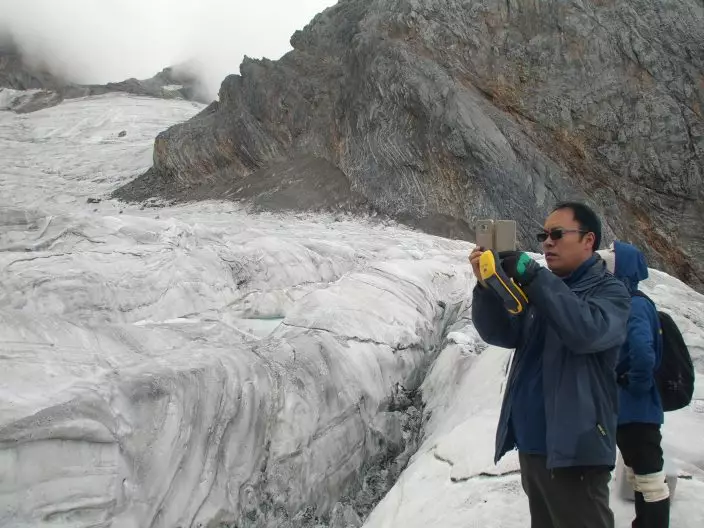
This Sept. 22, 2018 photo shows glaciologist Wang Shijin photographing the Baishui Glacier No.1 on the Jade Dragon Snow Mountain in the southern province of Yunnan in China. Scientists say the glacier is one of the fastest melting glaciers in the world due to climate change and its relative proximity to the Equator. It has lost 60 percent of its mass and shrunk 250 meters since 1982. (AP PhotoSam McNeil)
For years, scientists have observed global warming change Jade Dragon Snow Mountain in the Chinese province of Yunnan.
One research team has tracked Baishui's retreat of about 30 yards (27 meters) per year over the past decade. Flowers, such as snow lotus, have rooted in exposed earth, says Wang Shijin, a glaciologist and director of the Yulong Snow Mountain Glacial and Environmental Observation Research Station, part of a network run by the Chinese Academy of Sciences.
Nestled into a suburb of Lijiang, population 1.2 million, the station is home to Wang and his team: geologist and drone operator Chen, postgraduate glaciology student Zhou Lanyue and electrical engineer Zhang Xing, a private contractor.
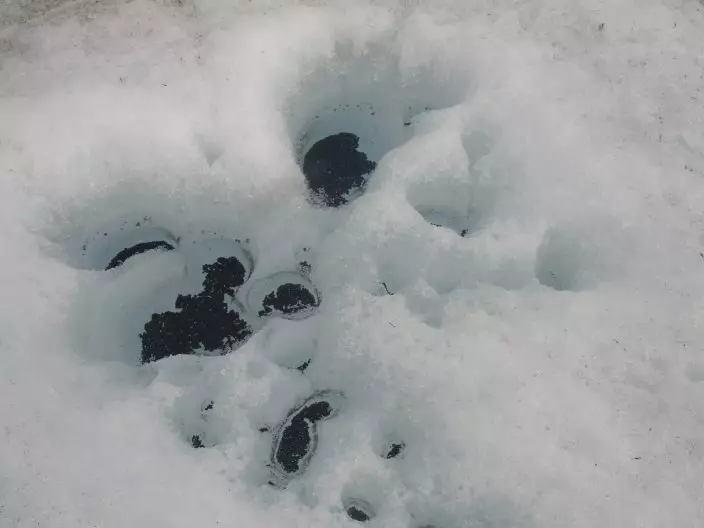
This Sept. 22, 2018 photo shows pools of melt water at the Baishui Glacier No.1 on the Jade Dragon Snow Mountain in the southern province of Yunnan in China. Scientists say the glacier is one of the fastest melting glaciers in the world due to climate change and its relative proximity to the Equator. It has lost 60 percent of its mass and shrunk 250 meters since 1982. (AP PhotoSam McNeil)
After breakfast, the team heads off by van for the day's mission. A cable car carries them up to a majestic view of the Jade Dragon Snow Mountain.
The team operates remote sensors that collect data on temperature, wind speed, rainfall, and humidity. Other sensors measure water flow in streams fed by melted ice. Cold, downpours, rock slides, gales and glacier movement break the equipment.
"It is not easy to encounter good weather here," Wang said.
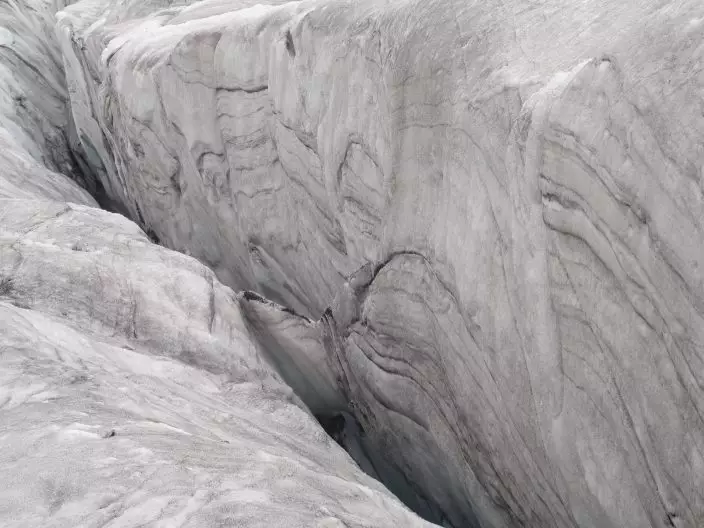
This Sept. 22, 2018 photo shows the Baishui Glacier No.1 on the Jade Dragon Snow Mountain in the southern province of Yunnan in China. Scientists say the glacier is one of the fastest melting glaciers in the world due to climate change and its relative proximity to the Equator. It has lost 60 percent of its mass and shrunk 250 meters since 1982. (AP PhotoSam McNeil)
This weather will ensure Yunnan has plenty of freshwater while other glacier loss poses serious risk of drought across the Third Pole, he said.
The next day, the team wore crampons while repairing more sensors scattered across the glacier's crags.
"Where we're at right now was back in 2008 all covered with ice," Wang said. "From here to there at the side, the glacier shrank about 20 to 30 meters. The shrinking is very remarkable."
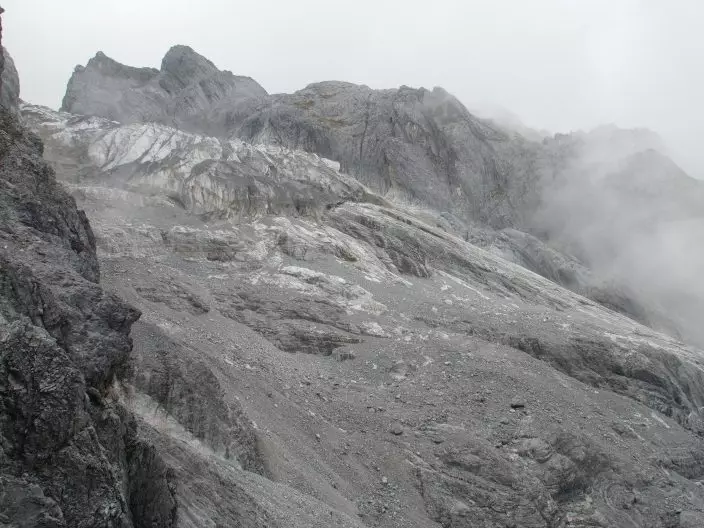
This Sept. 21, 2018 photo shows the lower edge of the Baishui Glacier No.1 above grey rocks previous covered in ice in Jade Dragon Snow Mountain in the southern province of Yunnan in China. Scientists say the glacier is one of the fastest melting glaciers in the world due to climate change at its relative proximity to the Equator. It has lost 60 percent of its mass and shrunk 250 meters since 1982. (AP PhotoSam McNeil)
The team forded streams and jumped crevasses in search of long iron bars they previously embedded in the ice. GPS tells them how much the bars, and thus the glacier, have moved. They also measure how much height the glacier has lost during the summer.
Back on the viewing platform, Che launched a buzzing camera drone over the white expanse. The photographs help tell a story of staggering loss. A quarter of its ice has vanished since 1957 along with four of its 19 glaciers, researchers have found.
Changes to the Baishui provide the opportunity to educate visitors about global warming, Wang said.
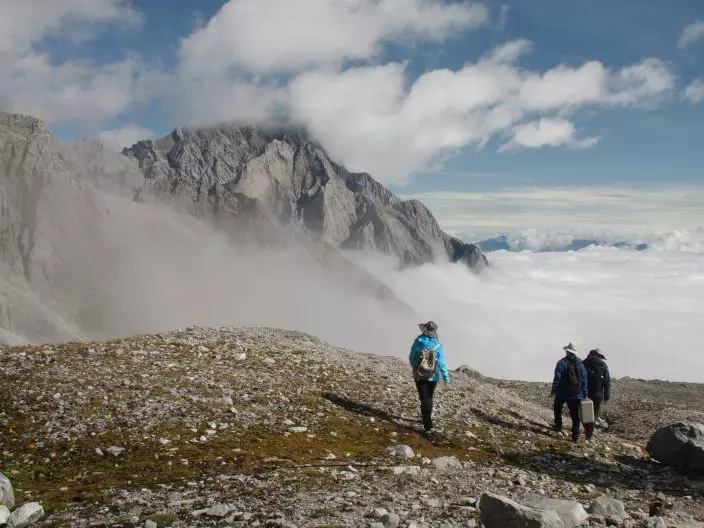
This Sept. 21, 2018 photo shows a Chinese Academy of Sciences research team atop the Jade Dragon Snow Mountain in the southern province of Yunnan in China. They are part of ongoing efforts to track the melting of the mountain's Baishui Glacier No.1 which has lost 60 percent of its mass and shrunk 250 meters since 1982. (AP PhotoSam McNeil)
Last year, 2.6 million tourists visited the mountain, according to Yulong Snow Mountain park officials.
On blustery day recently, hundreds of tourists climbed wooden stairs through grey fog to snap selfies in front of the glacier.
Hou Yugang said he wasn't too bothered over climate change and Baishui's melting. "I don't think about it now because it still has a long way to go," he said.
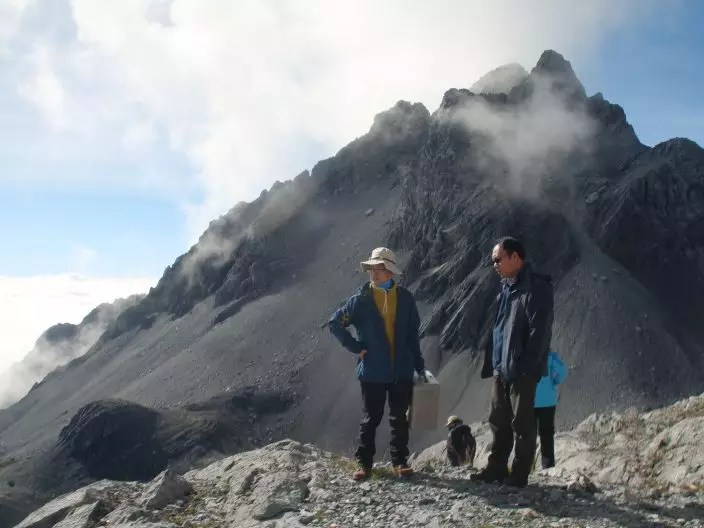
This Sept. 21, 2018 photo shows geologist Chen Yanjun, left, and glaciologist Wang Shijin atop the Jade Dragon Snow Mountain in the southern province of Yunnan in China while on their seasonal study of the Baishui Glacier No.1. Scientists say the glacier is one of the fastest melting glaciers in the world due to climate change and its relative proximity to the Equator. It has lost 60 percent of its mass and shrunk 250 meters since 1982. (AP PhotoSam McNeil)
To protect the glacier, authorities have limited the number of visitors to 10,000 a day and have banned hiking on the ice. They plan to manufacture snow and to dam streams to increase humidity that slows melting.
Security guard Yang Shaofeng has witnessed a warming world melting this mountain, which his local Naxi minority community considers sacred.
Yang remembers being able to see the glacier's lowest edge from his home village. No longer.
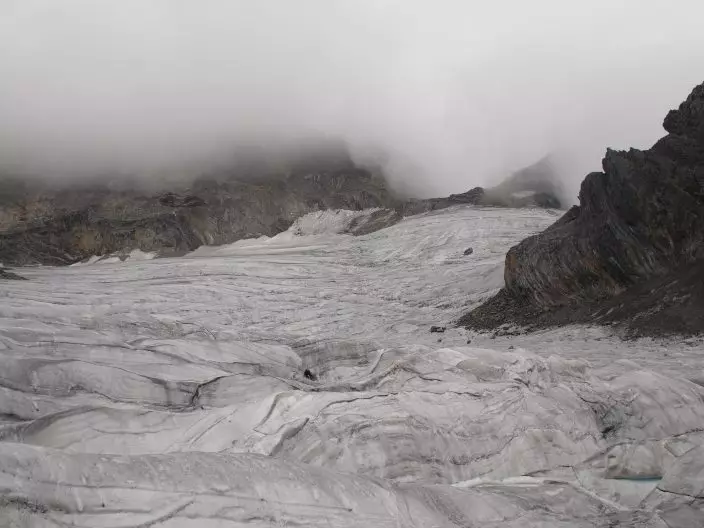
This Sept. 22, 2018 photo shows the Baishui Glacier No.1 on the Jade Dragon Snow Mountain in the southern province of Yunnan in China. Scientists say the glacier is one of the fastest melting glaciers in the world due to climate change and its relative proximity to the Equator. It has lost 60 percent of its mass and shrunk 250 meters since 1982. (AP PhotoSam McNeil)
"Only when we climb up can we see it," he said sadly, as tourists lined up to have their names engraved on medallions bearing the glacier's image.
The etching is already outdated.
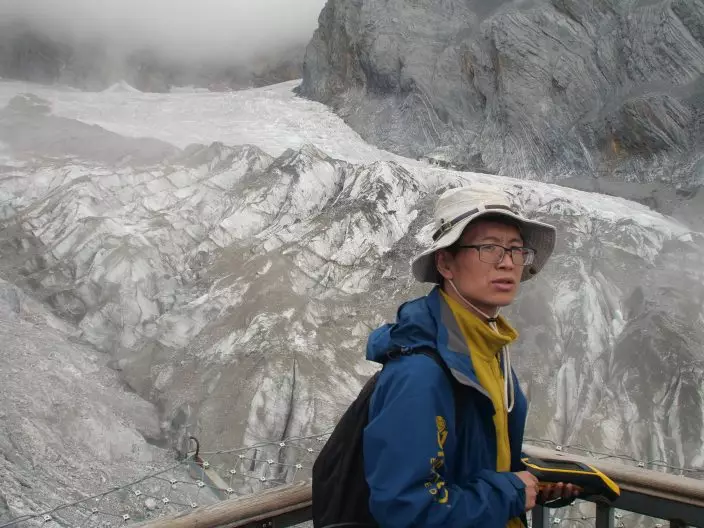
This Sept. 22, 2018 photo shows geologist Chen Yanjun overlooking the Baishui Glacier No.1 on the Jade Dragon Snow Mountain in the southern province of Yunnan in China. Scientists say the glacier is one of the fastest melting glaciers in the world due to climate change and its relative proximity to the Equator. It has lost 60 percent of its mass and shrunk 250 meters since 1982. (AP PhotoSam McNeil)
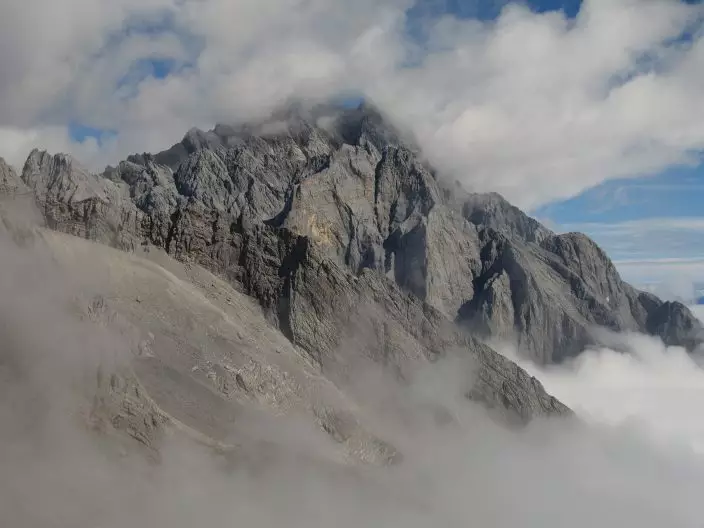
This Sept. 21, 2018 photo shows the Jade Dragon Snow Mountain in the southern province of Yunnan in China home to a glacier that scientists say is one of the fastest melting glaciers in the world due to climate change and its relative proximity to the Equator. It has lost 60 percent of its mass and shrunk 250 meters since 1982. (AP PhotoSam McNeil)
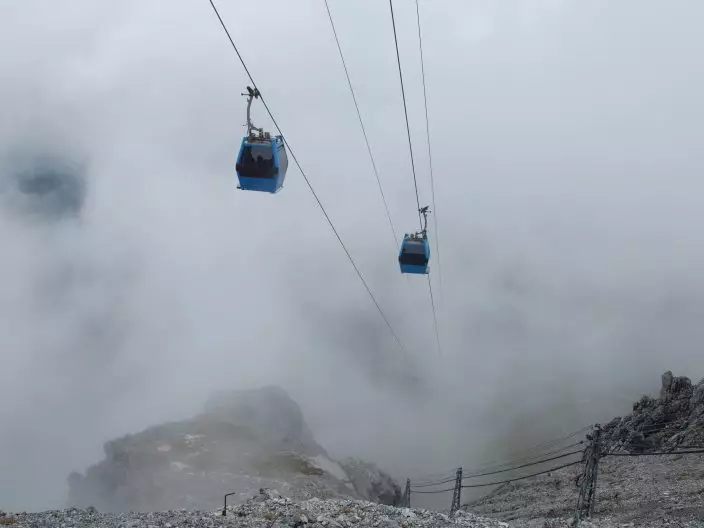
This Sept. 21, 2018 photo shows cable cars ascending nearly a kilometer to the top of the Jade Dragon Snow Mountain in the southern province of Yunnan in China home to the Baishui Glacier No.1. Scientists say the glacier is one of the fastest melting glaciers in the world due to climate change and its relative proximity to the Equator. It has lost 60 percent of its mass and shrunk 250 meters since 1982. (AP PhotoSam McNeil)
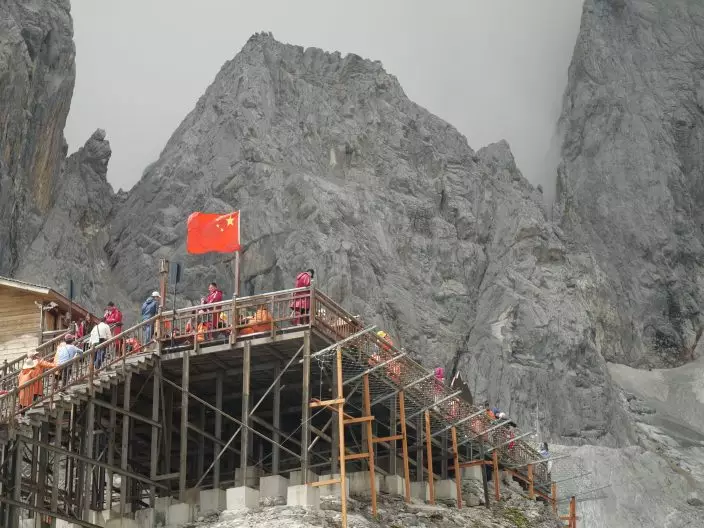
This Sept. 22, 2018 photo shows tourists visiting the Baishui Glacier No.1 atop of the Jade Dragon Snow Mountain in the southern province of Yunnan in China home. Scientists say the glacier is one of the fastest melting glaciers in the world due to climate change and its relative proximity to the Equator. It has lost 60 percent of its mass and shrunk 250 meters since 1982. (AP PhotoSam McNeil)
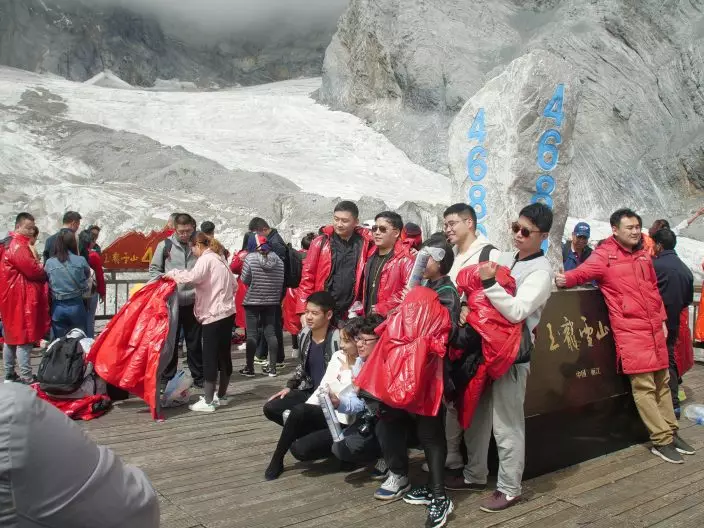
This Sept. 22, 2018 photo shows tourists visiting the Baishui Glacier No.1 atop of the Jade Dragon Snow Mountain in the southern province of Yunnan in China. Scientists say the glacier is one of the fastest melting glaciers in the world due to climate change and its relative proximity to the Equator. It has lost 60 percent of its mass and shrunk 250 meters since 1982. (AP PhotoSam McNeil)
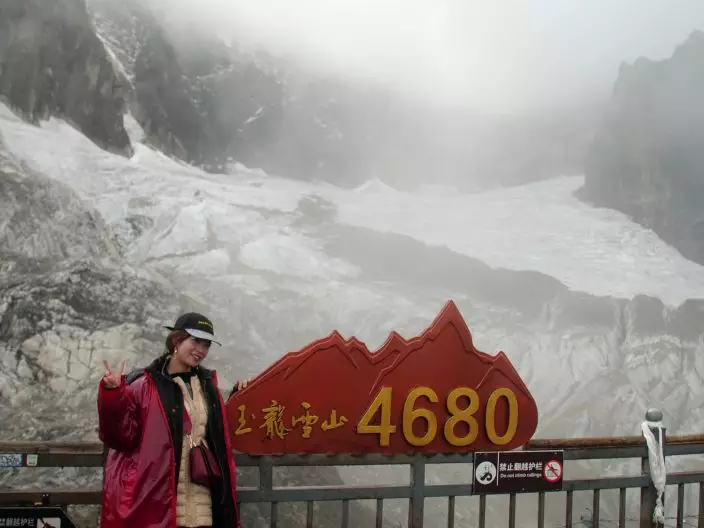
This Sept. 22, 2018 photo shows a tourist posing before the Baishui Glacier No.1 atop of the Jade Dragon Snow Mountain in the southern province of Yunnan in China. Scientists say the glacier is one of the fastest melting glaciers in the world due to climate change and its relative proximity to the Equator. It has lost 60 percent of its mass and shrunk 250 meters since 1982. (AP PhotoSam McNeil)
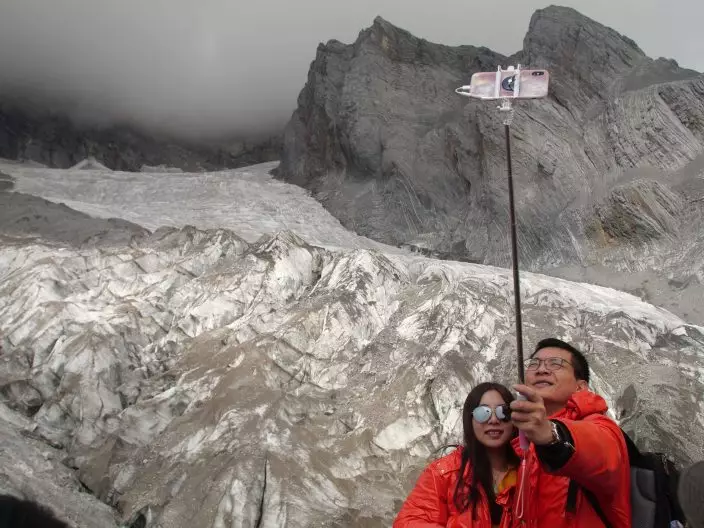
This Sept. 22, 2018 photo shows tourists posing for a selfie before the Baishui Glacier No.1 atop of the Jade Dragon Snow Mountain in the southern province of Yunnan in China. Scientists say the glacier is one of the fastest melting glaciers in the world due to climate change and its relative proximity to the Equator. It has lost 60 percent of its mass and shrunk 250 meters since 1982. (AP PhotoSam McNeil)
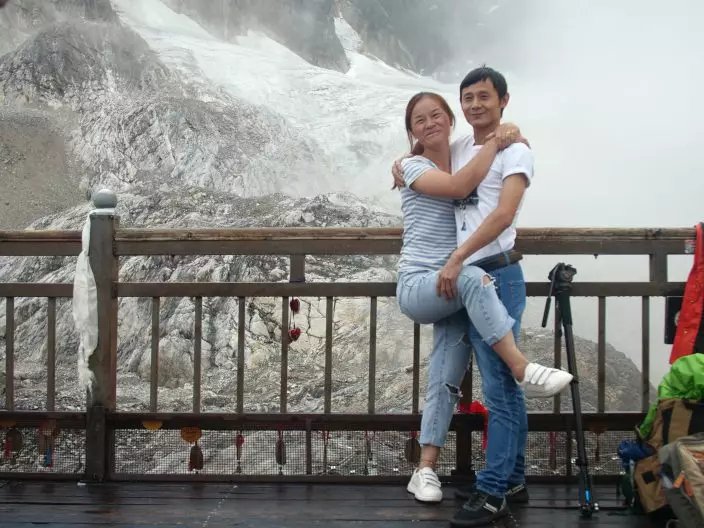
This Sept. 22, 2018 photo shows tourists posing before the Baishui Glacier No.1 atop of the Jade Dragon Snow Mountain in the southern province of Yunnan in China. Scientists say the glacier is one of the fastest melting glaciers in the world due to climate change and its relative proximity to the Equator. It has lost 60 percent of its mass and shrunk 250 meters since 1982. (AP PhotoSam McNeil)

This Sept. 21, 2018 photo shows a tourist posing with a yak atop the Baishui Glacier No.1 on the Jade Dragon Snow Mountain in the southern province of Yunnan in China. About 2.6 million visitors come every year to see the glacier which scientists say is one of the fastest melting glaciers in the world due to climate change and its relative proximity to the Equator. (AP PhotoSam McNeil)

This Sept. 22, 2018 photo shows tourists sharing an oxygen tank 4,680 meters above sea level atop atop of the Jade Dragon Snow Mountain in the southern province of Yunnan in China overlooking a glacier scientists say is one of the fastest melting glaciers in the world due to climate change and its relative proximity to the Equator. (AP PhotoSam McNeil)
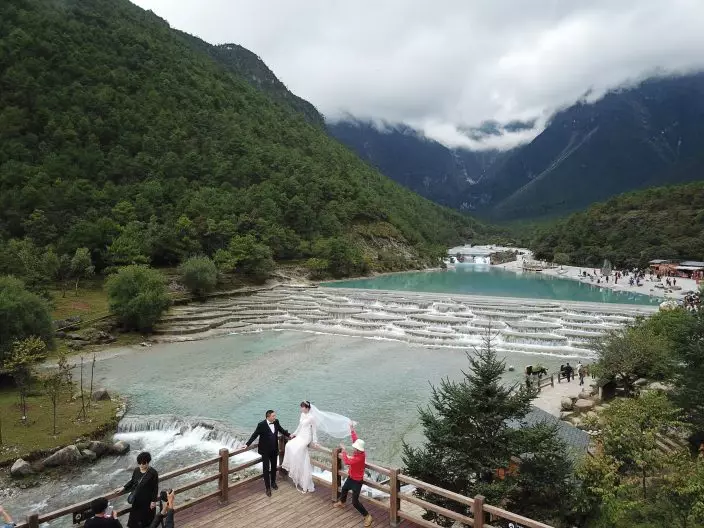
This Sept. 21, 2018 aerial photo shows a couple posing for photographs at the Valley of the Blue Moon glacial lake fed by the Baishui Glacier No.1 atop the Jade Dragon Snow Mountain in the southern province of Yunnan in China. Scientists say the glacier is one of the fastest melting glaciers in the world due to climate change and its relative proximity to the Equator. (AP PhotoSam McNeil)
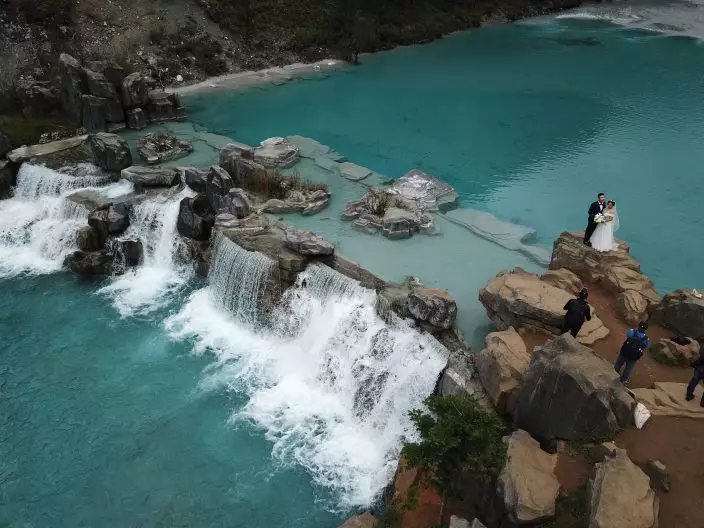
This Sept. 21, 2018 aerial photo shows a couple posing for photographs at the Valley of the Blue Moon glacial lake fed by the Baishui Glacier No.1 atop the Jade Dragon Snow Mountain in the southern province of Yunnan in China. Scientists say the glacier is one of the fastest melting glaciers in the world due to climate change and its relative proximity to the Equator. (AP PhotoSam McNeil)
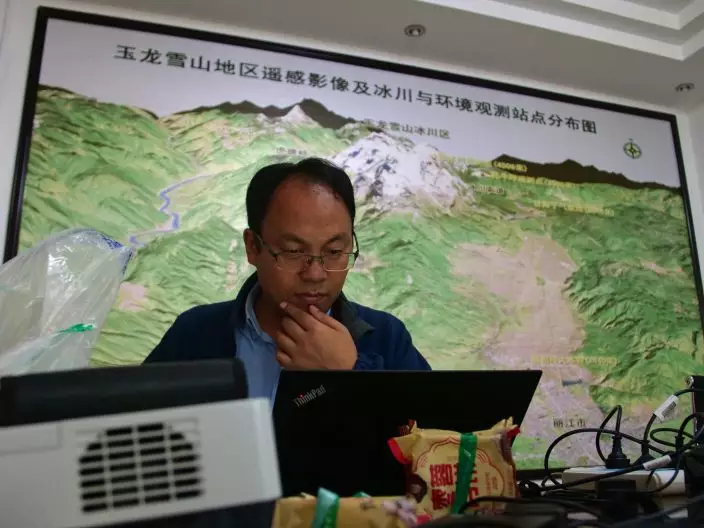
This Sept. 21, 2018 photo shows glaciologist Wang Shijin at the Chinese Academy of Science glacier station in Linjiang in the southern province of Yunnan in China. He and other researchers have tracked the Baishui Glacier No. 1, one of the world's fastest melting glaciers, rapidly shrink due to climate change and its relative proximity to the Equator. (AP PhotoSam McNeil)
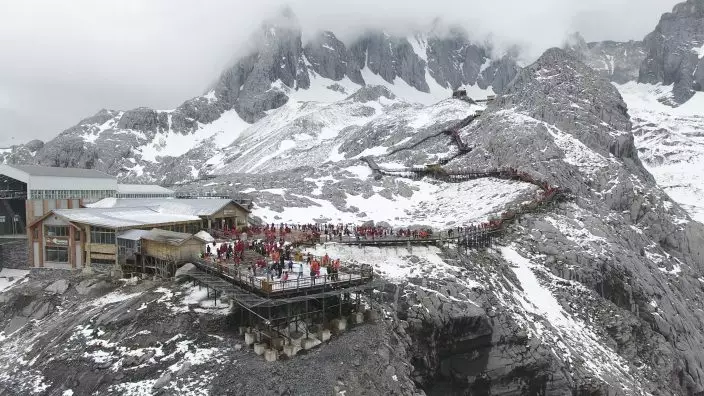
In this photo taken May 2018, and released by Yulong Snow Mountain Glacier and Environmental Observation Research Station on Oct. 18, 2018, tourists gather on a platform above the Baishui Glacier No.1 on the Jade Dragon Snow Mountain in the southern province of Yunnan in China. Scientists say the glacier is one of the fastest melting glaciers in the world due to climate change and its relative proximity to the Equator. It has lost 60 percent of its mass and shrunk 250 meters since 1982. (Yulong Snow Mountain Glacier and Environmental Observation Research Station via AP)
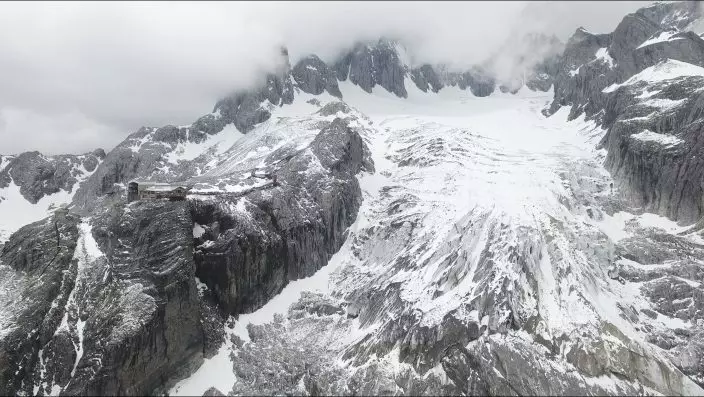
In this photo taken May 2018 and released by Yulong Snow Mountain Glacier and Environmental Observation Research Station on Oct. 18, 2018, the Baishui Glacier No.1 is visible next to a tourist viewing platform high in the Jade Dragon Snow Mountain in the southern province of Yunnan in China. Scientists say the glacier is one of the fastest melting glaciers in the world due to climate change and its relative proximity to the Equator. It has lost 60 percent of its mass and shrunk 250 meters since 1982. (Yulong Snow Mountain Glacier and Environmental Observation Research Station via AP)






